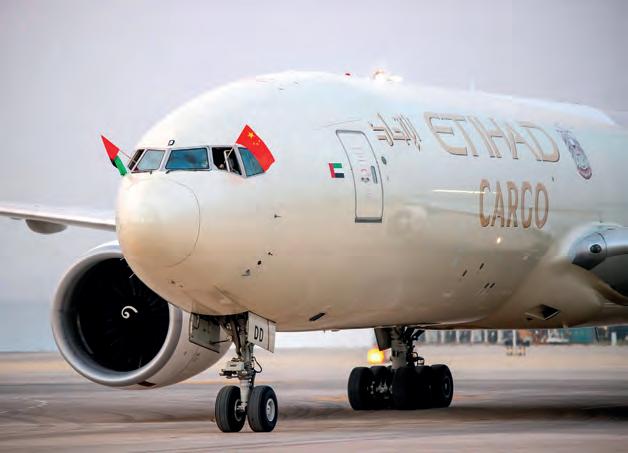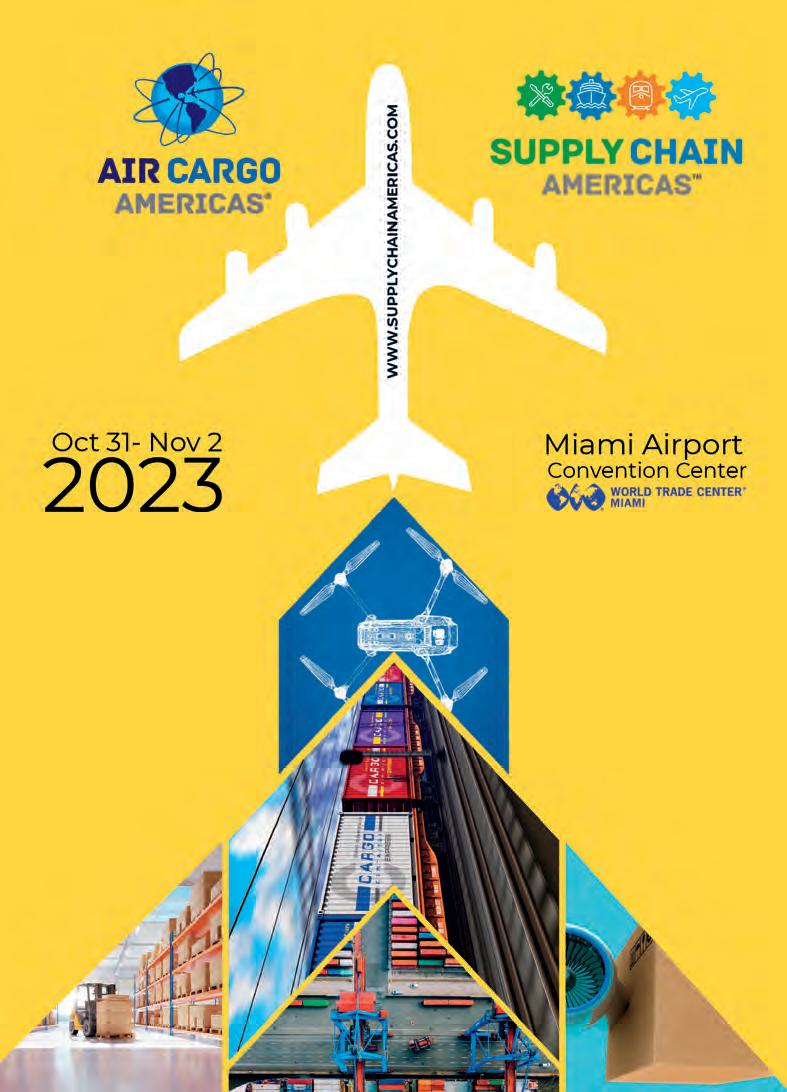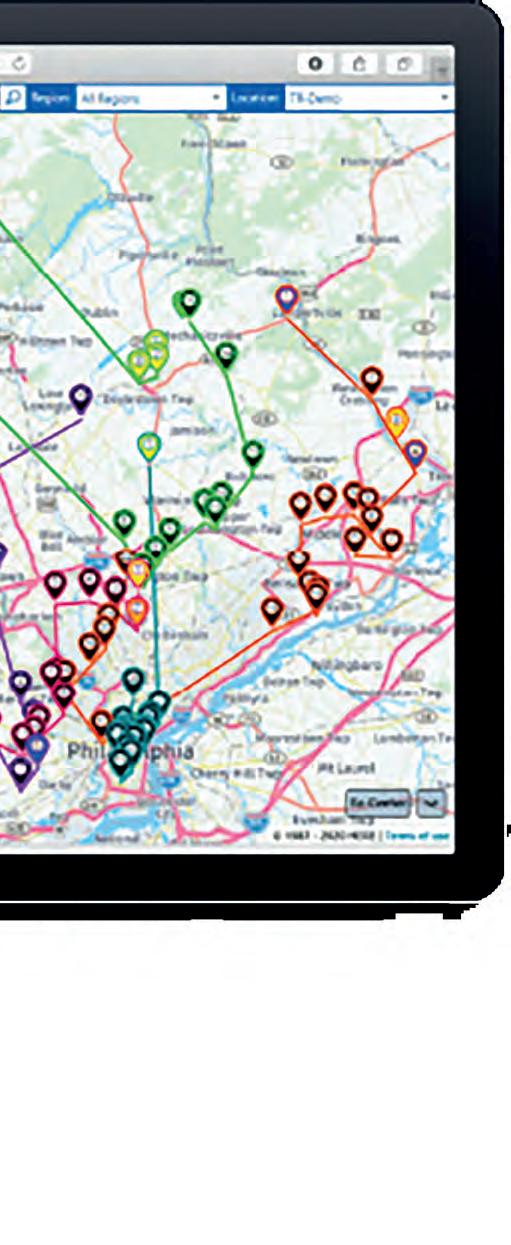
























The weekly newspaper for air cargo professionals




No. 1,245 28 August 2023






























No. 1,245 28 August 2023
Luo Guowei, Party Secretary and Chairman of Hubei International Logistics Airport Co. Ltd., said: “We are delighted to witness the inaugural launch of Etihad Cargo’s freighter flight to Ezhou Huahu Airport, marking the commencement of freighter services between Abu Dhabi and Ezhou. As a major national productivity project and a gateway for air trade between China and the rest of world, Ezhou Huahu Airport stands as the first professional cargo hub airport in Asia and the fourth of its kind in the world. The introduction of a weekly freighter service between Abu Dhabi and Ezhou will play an important role in promoting seamless connectivity between China and countries and regions along the ‘Belt and Road’.”
TRANSFORMING AIRFREIGHT ...
In a bid to revolutionise communication in the airfreight and aviation industry between all stakeholders, EDIfly has unveiled its technological approach
PAGE 2
PARTNERSHIPS DRIVE ...

Etihad Cargo has operated the carrier’s inaugural flight to Ezhou Huahu Airport. Etihad Cargo’s Boeing 777-200 freighter arrived in Ezhou on 18 August, making the carrier the first international airline to operate flights to the airport.

Located in the Hubei Province of China, Ezhou Huahu Airport was developed as Asia’s first and the world’s fourth professional cargo airport. Equipped with a 23,000-sq m cargo terminal and a 700,000-squaremetre freight transit centre, the airport serves as a gateway for air trade between China and the rest of the world. The airport is expected to open ten international cargo routes and 50 domestic routes by 2025, with an annual cargo and mail throughput of 2.45 million tonnes.
Etihad Cargo’s expansion to Ezhou Huahu Airport follows the carrier’s announcement that it has expanded
its reciprocal block space agreement with SF Airlines to increase cargo capacity between China and the rest of the world via Etihad Cargo’s hub in Abu Dhabi. This partnership has given Etihad Cargo’s partners and customers greater accessibility to 25 domestic Chinese destinations, including Shenzhen, Hangzhou, Chengdu and Nanjing. SF Airlines benefits from Etihad Cargo’s global network for its express product.
Leonard Rodrigues, Head of Revenue Management, Fleet and Network at Etihad Cargo, said: “Offering connectivity to China’s five national-level city clusters via railway, waterway, expressway and air transportation infrastructure, Ezhou Huahu Airport is the region’s first dedicated, professional cargo airport. The commencement of a weekly freighter service between Abu Dhabi and Ezhou opens up new interline opportunities with Etihad
Cargo’s partner SF Airlines and will enable the carrier to further expand its reach into the Chinese market, which is a key region to the airline and Etihad Cargo’s customers and partners.”

The addition of Ezhou to Etihad Cargo’s network is the latest step in the carrier’s ongoing commitment to the Chinese market. The new freighter service between Abu Dhabi and Ezhou will enable Etihad Cargo to meet increased demand for cargo capacity out of China and cement the carrier’s position as the air cargo partner of choice in this key region.

THE airfreight industry is embracing technological advancements as part of an effort to streamline operations and improve customer ...
PAGE 4
DIGITAL JOURNEY DRIVES ...
IN a bid to enhance customer experience and streamline operations, Air France KLM Martinair Cargo (AFKLMP Cargo) has been ...

PAGE 5
THE FUTURE OF SUPPLY CHAIN ...
In the dynamic world of logistics, staying ahead of the competition requires constant innovation and adaptation. One company that has been focused on improving cargo tracking and supply chain visibility is Descartes. With their cutting-edge tracking ...
PAGE 6
IN a bid to revolutionise communication in the airfreight and aviation industry between all stakeholders, EDIfly has unveiled its technological approach.
EDIfly’s offering provides a realistic means of secured communication based on existing industry protocols that the vast majority of the stakeholders support.
“EDIfly takes this mechanism to the internet age by providing end-to-end encryption, an instant proof of delivery,” Ingo Roessler, Chief Commercial Officer of EDIfly, said.
Digitising the air cargo sector has been long overdue, especially for airlines outside the top tier, as they were often underinvested in systems that supported collaboration. Furthermore, the integration of various systems was hindered by volume-based charging models employed by connectivity providers. However, EDIfly’s latest technology has taken a new approach, allowing realtime access to airlines’ reservation systems and greatly benefiting the distribution of air cargo services.
One of the key factors that make EDIfly’s technology unique is its approach to data security. Unlike traditional methods that rely on
private networks or fixed links, EDIfly secures the transmission of messages using end-to-end encryption over the public internet’s vast routing capacity.
“EDIfly’s technology provides true end-to-end encryption on par with what people perceive is only provided through bespoke VPN links,” Roessler explained.
EDIfly’s high-performance message broker integrates applications across various ground-based services in aviation, including airports, ground handlers, logistics services, cargo system providers, and even governments.
The cost reduction offered by EDIfly is another enticing feature for industry players. The savings can be achieved in multiple areas, such as avoiding transaction- or volume-related charges and replacing costly infrastructures, eliminating internal integration hubs.
“EDIfly allows users to synchronise content without the need to observe volume-based charging, improving the quality of information in real time, when it happens and not in a batch run that only happens in defined intervals,” Roessler added.
A major advantage of EDIfly is its seamless integration with existing IATA addresses used by various service providers, including SITA, ARINC, LH Systems, and Amadeus.

“Every party deploying the EDIfly’s software can keep their existing addresses. SABRE actually uses EDIfly as its backbone service for the entire messaging landscape of its services,” Roessler explained.
In terms of infrastructure requirements, EDIfly operates on basic infrastructure and standard software components, making it accessible to companies with varying degrees of technological advancement.
EDIfly boasts an impressive message handling capacity which is not restricted by character limits like legacy exchanges.
“EDIfly is not restricted to 5,000 characters like legacy exchanges, to avoid truncated exchanges. Of course, systems at each end must be able to process such content. The technical limitation for each exchange is 2 GB, with an average size of 300 kb, we are very much on the safe side and most exchanges happen in less than one second,” Roessler said.
To ensure high-availability infrastructure for mission-critical services, EDIfly’s software can be adapted to various industrystandard mechanisms. SABRE, one of the industry’s biggest players, has already embraced EDIfly’s high-availability solution as core infrastructure supporting all services.
Despite the evident advantages EDIfly offers, the airfreight industry as a whole is not moving fast enough to fully capitalise on the potential presented by technology. Many efforts to introduce new standards have been met with challenges, delaying progress. In this context, EDIfly’s backward-compatible mechanism emerges as an efficient and effective solution that addresses the vast majority of the industry’s needs.
Despite the opportunities presented by innovative operations, EDIfly believes that the speed at which technology is being embraced in the industry is nowhere near fast enough.
“Much energy has been wasted on trying to introduce new standards, like Cargo XML, which can possibly be categorised a failure, but losing the industry a decade or so,” Roessler warned.
“I fear that many people underestimate the complexity of rolling out new standards on a global scale. EDIfly offers a backwardscompatible mechanism that probably supports 98.5% of all exchanges needed in this business, with existing systems and addressing logic,” he continued.” With its technological approach and the support of its partners, EDIfly can actively transform the airfreight industry by enhancing communication, improving data security, and streamlining processes, paving the way for a more efficient and connected future in aviation.
“Going viral by design as all EDIfly users are automatically connected to each other. As our founder and Chief Technology Officer Anders Dam Jensen would put it: ’The more. The merrier!,” Roessler added.
sales@azurainternational.com
subs@azurainternational.com
news@azurainternational.com
Editor: Edward Hardy
Supplement Editor: James Graham
Associate Editor: Chris Lewis
Contributors: David Craik, Stuart Flitton, Neil Madden, Donald Urquhart
Director of Operations: Kim Smith
International Sales Director: Rosa Bellanca
International Sales Executive: Zainab Khalid
Finance Manager: Rachel Burns
Design & Production Manager: Alex Brown
Production Supervisor: Kevin Dennis Website Consultant: Tim Brocklehurst
Directors: Norman Bamford • Dawn Jolley

THE airfreight industry is embracing technological advancements as part of an effort to streamline operations and improve customer experiences.
In that vein, Hermes Logistics Technologies (HLT) and Awery Aviation Software (Awery) are combining their expertise to offer a comprehensive end-to-end solution. By leveraging digital practices, these companies are looking to enhance transparency, efficiency, and customer satisfaction in the airfreight industry.

The partnership brings together two experienced companies, each with their own domain of expertise. By integrating their solutions, they can offer customers a comprehensive platform that covers the entire lifecycle of shipments.
Ushering in a new era of digitalisation, HLT and Awery launched an innovative Software as a Service (Saas) solution, managing all processes across the lifecycle of a shipment, called h2A.
This all-encompassing package looks to provide an enticing functional depth. Airlines can benefit from a wide selection of processes and functionalities, resulting in improved operational efficiency, reduced costs, and enhanced customer service. The partnership enables both companies to leverage their strengths, ensuring a seamless and reliable solution from end to end.

Synchronising the Industry Digitalisation plays a crucial role in driving efficiency and synchronising operations in the airfreight industry. Hermes and Awery recognise the need for a strong digital strategy to streamline processes, improve transparency, and optimise resource utilisation.
“We identified that we were missing the cargo booking, the sales, the reservations, the capacity, all that side. We didn’t have it and, if we wanted to offer our solution to airlines, we either needed to develop a solution or partner with an existing solution,” Yuval Baruch, Chief Executive Officer of HLT, said.
While some companies may be hesitant to embrace technology, the benefits of digital solutions are undeniable. By providing a comprehensive digital platform, Hermes and Awery eliminate the need for disparate solutions, reducing integration challenges and ensuring a unified and efficient workflow. The ability to offer end-to-end solutions and work closely with customers to develop their digital strategies positions both companies as key drivers of change in the industry.
“The idea was to bring customers one combined solution from one combined vendor. This means we can really assure the quality of the product as we have complete
oversight of the solution from A-Z,” Vitaly Smilianets, Chief Executive Officer of Awery, added.
Adopting digitalisation requires a shift in mindset and overcoming resistance to change. The partnership between Hermes and Awery addresses these challenges by offering a clear business case for digital transformation. Their comprehensive package mitigates risks, minimises customisation needs, and simplifies the digitalisation process for airlines.

“Our offering has a strong digital strategy. We are working closely with our customers to ensure h2A offers them the highest level of transparency and efficiency,” Baruch highlighted.
Both companies prioritise building strong relationships with customers, emphasising the importance of trust and collaboration in convincing industry players to embrace technology and drive positive change within their organisations.
“Sometimes we see people who don’t want to go digital. People see it as a bit of a threat, not to the job, but to the importance of the job,” Smilianets explained. “While I see all of these fears, they are an outdated mindset in today’s industry. In the end, digitalisation is not making you work less, it is making your work more efficient.”
While the pace of digitalisation in the airfreight industry is increasing, there is still room for growth and wider adoption. Many companies are still in the early stages of digital transformation, grappling with legacy systems and processes. However, the industry is recognising the importance of digitalisation in remaining competitive and meeting customer demands. The collaboration between Hermes and Awery provides a solution that is not only technologically advanced but also adaptable and future-proof.
“Our current clients are mostly midsize companies....They need an edge against the bigger companies and our solution could give them that edge,” Baruch said.
By sharing knowledge, collaborating, and embracing digital solutions, the industry can collectively drive progress and stay ahead in an ever-evolving market. “When you collaborate, you’re actually making your presence stronger because your offering is enhanced by the capabilities of your partners,” Smilianets said.
This is reflected in how the reluctance to adopt technology is gradually giving way to the realisation that digitalisation is a necessity rather than an option. “We’re hoping that this push for digitalisation will actually happen on the airline side. That they will participate in what we’re trying to achieve,” Baruch stated.
Running a fleet of ULDs is often mission-critical, with the risk of unforeseen challenges never far away. Additionally, meeting passengers’ expectations and increasing cargo revenues in an uncertain global economy requires a strategic partner with the right ULD solutions for airlines’ needs.
ULDs are part of Unilode’s DNA. The company’s roots stretch back to the original ULD management pioneer, who introduced the ULD outsourcing concept and pooling business model to the aviation industry more than 20 years ago. Today, Unilode is the leading global provider of outsourced ULD management and digital solutions, and ULD and galley cart maintenance and repair services.
Unilode’s asset management, leasing, repair and digital solutions for ULDs, and maintenance and repair services for galley carts help airlines to focus on their core business of flying passengers and cargo whilst delivering significant cost savings, operational efficiencies and environmental benefits across their network.

Unilode’s tailor-made ULD management solutions meet the specific needs of its airline customers and ensure the supply of the right ULDs in an airworthy condition, in the right place and at the right time, every time. Unilode manages the largest global fleet of approximately 160,000 ULDs, providing ULD management solutions for 45 airline customers to date. Unilode was voted the most sustainable ULD provider of the industry thanks to its innovative and environmentally friendly ULD solutions and sustainability practices that help reduce the environmental footprint of the aviation industry.
Unilode won IATA’s Air Cargo Innovation Award twice with its digitalisation programme. More than 90% of Unilode’s container and pallet fleet has already been digitised and the reader network has been expanded to around 1,500 fixed readers and thousands of mobile readers around the world. Unilode’s digital ecosystem creates transparency, control and visibility across the supply chain and contributes to customers’ efforts to optimise operations, increase efficiencies and provide better quality assurance to all players in the value chain, including airlines, shippers, freight forwarders, ground handlers, airports and end customers. Unilode’s digital ecosystem can be used not only for ULDs but for galley carts, dollies and other equipment as well.
Unilode can also help to overcome the temporary challenges of ULD shortages with its flexible leasing solutions at various key airport locations. Leasing periods are available from as little as seven days, and one-way rental, rebranding options and cost-effective repairs are offered at competitive rates.
The company operates the world’s largest repair network for ULDs and galley carts with 50 stations at key airports, 36 of which are owned by Unilode, and provides MRO services to more than 50 customers, in addition to its own ULD management customer base. Unilode’s MRO solutions remove the burden and unnecessary costs of shipping damaged equipment back to the hub and increase space for revenuegenerating cargo.
Whether airlines are looking to outsource the management of their container and pallet fleet, lease ULDs, gain access to the latest innovations in digitalisation, or remove the burden of repair and maintenance of ULDs and galley carts, Unilode can help them improve the performance of their business in various areas.

For more information visit www.unilode.com or email info@unilode.com


IN a bid to enhance customer experience and streamline operations, Air France KLM Martinair Cargo (AFKLMP Cargo) has been actively investing in its digital strategy.
Over the past six years, AFKLMP Cargo has been developing its proprietary customer platform, myCargo. This platform was built in-house, leveraging a mix of technical experts and industry insiders. “This is confirmed by our results where we reached last month a record of 75% of bookings initiated via digital channels,” Bernard Geersing, VP Distribution and Customer Service at Air France KLM Martinair Cargo, said.
MyCargo’s journey began with a “Quote & Book” option, allowing customers to request quotes based on published rates and then manually booking via a back-office process. However, the platform has evolved significantly.
Geersing highlighted, “Ever since we introduced Quote & Book, which in the meantime is fully automated making use of dynamic pricing, our teams in collaboration with our customers worked on many new ideas.” This led to the addition of features like Track & Trace, station capability tools, claims management, and specialised services for products like Pharma and Express.
Optimising customer contact
This year has been a pivotal one for AFKLMP Cargo’s digital journey. The company introduced the “Modify My Booking” option, GoSAF, and the Quick Allotment Booking functionality. This leap in functionality means customers can book and manage their allocations via myCargo, streamlining efficiency and control. Geersing explained, “This is a huge step forward for our customers in terms of efficiency and the control of their allocations.”
AFKLMP Cargo also has more plans in the pipeline. Geersing shared, “Later this year we will also introduce a simplified and next-level product portfolio. This will help to make much more transparent the way we structure, sell, and service our products.”
“It’s key for our customers that it’s easy to do business with us by giving the customer as much a possible choice and control.”
AFKLMP Cargo’s approach to digitalisation is rooted in their vision to provide the best experience possible. Geersing emphasised the synergy between technology and human expertise. “We believe in a well-balanced model whereby we can deliver 24/7 service excellence through state-of-theart digital solutions next to human expertise of our service teams around the globe.”
“Digital and human expertise go hand in hand to drive worldwide sales and service teams in order to deliver optimal customer experiences.”
In order to take customer service to the next level, AFKLMP Cargo’s partnerships with Salesforce and Vonage plays a crucial role. The integration of these technologies enables customer service teams worldwide with the latest technology in order to fully service customers in various channels.

AFKLMP Cargo’s digital strategy isn’t one-size-fits-all. Geersing stated, “Our digital strategy is centered around putting customer experience central.” Through collaboration with customers, industry insights, and technical prowess, the company continuously innovates and improves its services. This localised approach ensures that myCargo caters to the specific needs and preferences of customers in different regions and industries.
In addition to the initial release, Air France KLM Martinair Cargo plans to introduce several new myCargo features in the months to come. In addition, this month it has been made possible to make bookings for Dangerous Goods via myCargo.
“This was a big request from our customers, and we are very pleased to make it available now for all to use. Next to this it is also planned to launch other new digital services, such as E-Pharma (E-CAPA) and a digital solution for shipper leased containers, in the near future.”
Looking ahead, Geersing foresees rapid digitalisation in the airfreight industry. He predicts more functionalities being digitised, creating a dynamic and innovative landscape
that benefits customers. This transformation will unbundle product and service propositions, leading to increased efficiency and innovation.
“The speed of digitalisation in the airfreight industry will only increase moving forward,” Geersing said. “Product and service propositions will be unbundled and innovated upon - you see this now happening with all the different payment solutions of 3PP’s and products like insurance coming up.”

AFKLMP Cargo is also actively involved in the industry-wide e-freight programme, aiming to create a paperless process for the supply chain. The e-AWB (electronic Air Waybill) is a cornerstone of this initiative, replacing paper AWBs and contributing to a greener and more efficient supply chain.
“The e-freight programme is an industry wide initiative involving all actors in the air cargo supply chain: carriers, freight forwarders, ground handlers, shippers, customs brokers and customs authorities,” Geersing stated. “As the e-AWB replaces the paper AWB as the legal contract of carriage, there is no longer a need to print, handle or archive a paper AWB which enables a completely paperless supply chain.”
In the dynamic world of logistics, staying ahead of the competition requires constant innovation and adaptation. One company that has been focused on improving cargo tracking and supply chain visibility is Descartes. With their cuttingedge tracking systems and innovative technology, Descartes is transforming the way information is gathered and shared in the air messaging space.
“Descartes has been in the sector for 30 years, connecting and gathering information to share between multiple parties, whether it’s freight forwarders, airlines or government agencies,” Simon Gutschlag, Descartes’s Vice President of Product Management, Air Cargo Internet of Things Solutions, said.
Descartes has been a prominent player in the logistics space for over three decades, connecting and gathering information to facilitate seamless communication between multiple parties. In recent years, Descartes has embraced the evolution of tracking systems by introducing Unit Load Device (ULD) tracking and Bluetooth tracking. These advancements enable real-time tracking of assets in the field, moving beyond static system updates to live data collection through Descartes’ BLE (Bluetooth Low Energy) network.
The development of ULD tracking and Bluetooth tracking systems has been several years in the making, with a focus on expanding and improving the network’s density and coverage around airports and ground handling facilities. To overcome challenges posed by inconvenient asset storage locations, Descartes has introduced mobile and solar-powered readers. These solar-based readers, strategically placed in parking lots and other suitable locations, can efficiently track assets, such as pallets and containers, without
the need for external power sources. This innovative solution not only improves inventory management but also aligns with sustainability goals by utilising renewable energy.
“We’re a networking business and the ULD tracking that we’ve done is kind of the next evolution of that,” Scott Sangster, General Manager of Logistics Service Providers at Descartes explained. “It’s not just telling you what’s happened. We’re going out and actually recording it live in the field as it’s going on.”
The demand for enhanced supply chain visibility and real-time tracking has significantly influenced the adoption of Descartes’ tracking systems. Companies are now seeking comprehensive visibility from the start to the finish of their supply chain processes. For ULD tracking, the primary driving factor has been asset management optimisation. By accurately tracking assets’ location and ensuring timely returns, businesses can reduce the need for safety stock and improve utilisation, resulting in cost savings and operational efficiency.

“The technology not only helps expand the network but also improves the density of the network and the coverage around airports, ground handling facilities and so on,” Sangster explained. Additionally, the focus on “how’s my stuff” rather than just “where’s my stuff” has led to the integration of additional data elements in the tracking process. Descartes’ tags offer not only location tracking but also the monitoring of temperature, humidity, light detection, motion/shock detection, and equipment handling through accelerometers. These features provide an additional layer of value to customers, especially in sectors like shipping, pharmaceuticals, and cold chain logistics.
“From a shipment tracking perspective, people are much more interested in having that real time experience and understanding of the environment,” Gutschlag explained. “So that’s driven
“From a shipment tracking perspective, people are much more interested in having that real time experience and understanding of the environment”
adoption, giving an additional level of value to the customers.”
The real-time nature of Descartes’ tracking systems empowers businesses with quick reaction capabilities. For example, in a recent use case, a customer detected that a container had been opened at an airport without authorisation through the light sensor on the tag. Immediate action was taken to investigate the situation and prevent any theft or tampering. Such timely alerts enable businesses to protect their assets, ensure shipment integrity, and swiftly address any issues that may arise during transportation.
“It’s as close to real time as it’s able to do. If there’s a change, you’d know it,” Gutschlag highlighted. “You measure location, temperature, humidity, light detection, fire detection, etc.”
Descartes’ tracking systems can be deployed in any location as long as a reader can be positioned near an airport. However, the adoption of these systems varies across regions, driven by specific considerations. North American carriers, for instance, focus on covering their home territories first to gain visibility into their assets.

However, the value proposition often increases for assets that leave the carriers’ controlled facilities, making the system more beneficial for them in those locations. Thus, regional factors and operational dynamics influence the deployment and penetration of Descartes’ tracking solutions.
Descartes’ tags are designed to last for at least five years, with some tags even exceeding six or seven years of battery life. The longevity of the tags allows for prolonged use without
frequent replacements. Depending on customer requirements, Descartes provides a range of options, balancing battery life and data collection capabilities. The company continues to invest in research and development to improve the range, performance, and features of their tags, ensuring they stay at the forefront of technology advancements.
When introducing new technology, change management becomes a critical factor for success. Descartes acknowledges that the biggest challenge lies in managing the transition and getting people to adopt and embrace the new systems. “The biggest challenge is getting people away from the paper and manual data entry, changing the way they work,” Gutschlag said.

To overcome this, Descartes focuses on aligning with customer needs and clearly articulating the benefits of their technology. By demonstrating how the adoption of their systems can improve business processes, utilisation, and value-added work, Descartes helps customers understand the value proposition and navigate the change with confidence. “It’s great having technology but if people can’t simply understand it, they get spooked,” Sangster explained. “When you know how easy those processes are to implement and understand, technology is well received.”
Descartes believes in collaboration and partnerships to provide a comprehensive end-to-end solution for customers. They integrate their technology with other software products and systems, ensuring seamless data sharing and leveraging each partner’s strengths. In addition to software integrations, Descartes actively engages with logistics service providers, ground handlers, and ULD leasing companies to deliver additional value throughout the supply chain. “We’re always looking at new technology, new evolutions, new partners, constantly improving technology,” Gutschlag stated.
“It’s as close to real time as it’s able to do. If there’s a change, you’d know it”
